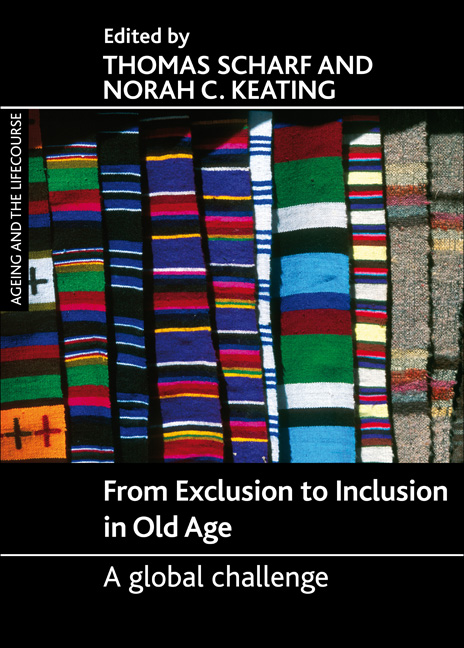Book contents
- Frontmatter
- Dedication
- Contents
- List of tables and figures
- Acknowledgements
- Notes on contributors
- Foreword
- one Social exclusion in later life: a global challenge
- two Globalisation, economic recession and social exclusion: policy challenges and responses
- three International migration: patterns and implications for exclusion in old age
- four Social inclusion of older people in developing countries: relations and resources
- five Exclusion from material resources: poverty and deprivation among older people in Europe
- six Social inclusion of elders in families
- seven The impact of changing value systems on social inclusion: an Asia-Pacific perspective
- eight Age discrimination as a source of exclusion in Europe: the need for a human rights plan for older persons
- nine Towards inclusive built environments for older adults
- ten Revisiting social exclusion of older adults
- Index
one - Social exclusion in later life: a global challenge
Published online by Cambridge University Press: 07 September 2022
- Frontmatter
- Dedication
- Contents
- List of tables and figures
- Acknowledgements
- Notes on contributors
- Foreword
- one Social exclusion in later life: a global challenge
- two Globalisation, economic recession and social exclusion: policy challenges and responses
- three International migration: patterns and implications for exclusion in old age
- four Social inclusion of older people in developing countries: relations and resources
- five Exclusion from material resources: poverty and deprivation among older people in Europe
- six Social inclusion of elders in families
- seven The impact of changing value systems on social inclusion: an Asia-Pacific perspective
- eight Age discrimination as a source of exclusion in Europe: the need for a human rights plan for older persons
- nine Towards inclusive built environments for older adults
- ten Revisiting social exclusion of older adults
- Index
Summary
Introduction
Social, economic and demographic trends associated with population ageing have the collective potential to increase dramatically the exclusion of older adults from societies’ major institutions and resources. In this respect, older people are especially prone to the recent volatility in the always-cyclical economic environment that results from increasingly enmeshed world economies (Jenson, 2004). The economic decline that began in 2008 with the collapse of major financial institutions and subsequent attempts to reduce the over-indebtedness of many Western nations has fundamentally changed the context of debates relating to population ageing. In times of austerity and growing economic instability, the potential risks of exclusion for older people become even more pronounced. In many Western nations, for example, there has been a marked shift in recent years from policies that acknowledge societies’ obligations towards different generations – as reflected in the notion of an ‘intergenerational contract’ that underpins national welfare states – towards a set of policies and practices that encourage individuals to assume personal responsibility for the ‘risks’ associated with their ageing (Baars et al, 2006). In other parts of the world, fledgling social policies – for example, in the form of non-contributory pensions or social health care programmes – or aspirations to introduce social protection schemes may also be threatened by the economic downturn (International Labour Organization, 2010). The capacity of individuals, families and communities to respond to an increasing individualisation of risks is, in turn, challenged by other social changes. For example, in many industrialised nations, family histories are becoming increasingly diverse: divorce and remarriage rates are higher, families are becoming smaller, and lifelong singlehood and childlessness are more common (Vanier Institute of the Family, 2004). Caring for family members is becoming a normative midlife experience, creating a cruel paradox, especially for women, who may experience disadvantage in old age as a result of earlier efforts to prevent ageing parents from experiencing it (Jenson, 2004; Szinovacz and Davey, 2007). Similarly, mobility patterns are changing the cultural fabric of many countries, resulting in growing numbers of transnational families (Baldassar, 2007; Hwang, 2008).
Taken together, these challenges dramatically increase the inequalities that characterise later life, and potentially reduce nations’ capacity to support the type of policies and practices that would minimise the gap between the haves and the have-nots.
- Type
- Chapter
- Information
- From Exclusion to Inclusion in Old AgeA Global Challenge, pp. 1 - 16Publisher: Bristol University PressPrint publication year: 2012
- 5
- Cited by

